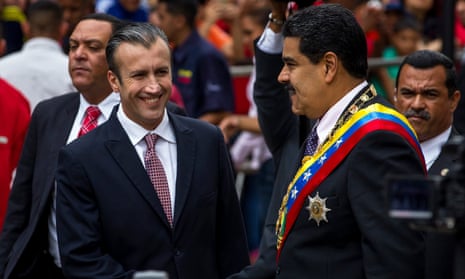Venezuela’s powerful vice-president has described his blacklisting by the United States on drug charges as an “imperialist aggression” in the first bilateral flare-up under the new US president, Donald Trump.
“We shall not be distracted by these miserable provocations,” Tareck El Aissami, the most senior Venezuelan official yet sanctioned by the United States, said in a series of defiant tweets.
“We will see this vile aggression dispelled.”
The US Department of Treasury on Monday labeled El Aissami a drug “kingpin”, accusing him of facilitating shipments by air and sea and having links to drug gangs in Mexico and Colombia.
The kingpin designation allows the treasury department to freeze any assets of individuals in the United States and prevents the person from conducting financial transactions going through the US.
El Aissami joined a sanctions list that already includes a half-dozen other Venezuelan officials or former officials.
The United States also sanctioned Samark López, a man it termed El Aissami’s “frontman”.
López also called the move politically motivated.
“Mr López is not a government official and has not engaged in drug trafficking,” said a statement on his website describing López as a “legitimate businessman”.
The socialist president, Nicolás Maduro, has frequently cast US and opposition accusations of drug trafficking, corruption and human rights abuses as a pretext to justify meddling in Venezuela and trying to topple him.
Maduro, 54, narrowly won election in 2013 to replace the late Hugo Chávez, but his popularity has plummeted amid an economic crisis in the country of 30 million people.
Though he frequently lambasted former president Barack Obama, the Venezuelan president has so far refrained from criticizing Trump.
The sanction on El Aissami, a 42-year-old lawyer and criminologist, will dent Maduro’s hopes that Trump might avoid a confrontation with Venezuela but could also help him by providing a nationalist card to play, said David Smilde, a Tulane University professor and Venezuela expert.
“This is a tremendous gift to Maduro as it ensures El Aissami’s loyalty. It essentially increases El Aissami’s exit costs and gives him a personal stake in the continuation of ‘Chavismo’,” he said.
“To be clear, El Aissami and others should be held responsible for their actions. However, it should be understood this process has pernicious unintended consequences. I think we are effectively witnessing the creation of a rogue state.”
El Aissami grew up poor in the Andean state of Mérida. He was a lawmaker, interior minister and state governor for the ruling Socialist party before becoming vice-president last month.
A longtime confidant and member of Chávez’s and Maduro’s inner circles, El Aissami was given wider powers as vice-president in a decree last month and is being touted in some circles as a possible future president.
Venezuelan opposition groups have long accused El Aissami of repressing dissent, participating in drug trafficking rings, and supporting Middle Eastern groups such as Hezbollah.
Narcotics experts say Venezuela has become a major global hub for drug shipments. The treasury department said El Aissami oversaw or partially owned shipments of more than 1,000kgs (2,200lb) on multiple occasions, including to Mexico and the United States.
The citation did not specify the drug, though the most common narcotic trafficked in the region is cocaine.
The sanction prohibits US citizens from transactions with the individuals on the list and freezes their assets.
“As a result of today’s action, significant real property and other assets in the Miami, Florida area tied to López Bello have been blocked,” it said, referring to Samark López.
The sanction was a departure from the so-called “soft landing” approach taken by Obama’s White House. At times it had clashed with efforts by the US justice department and Drug Enforcement Administration, which worked with informants in Venezuela to nab influential officials for money laundering and drug trafficking.
Since 2015, the Obama administration had sought to use behind-the-scenes diplomacy to ease acrimony with Caracas and the fallout from a string of US drug indictments against Venezuelan officials, including the interior minister, Néstor Reverol.
“When the right wing attacks us, it shows we are advancing. Nothing and nobody will stop our victorious march to peace,” Reverol tweeted on Tuesday in defence of El Aissami.
The blacklisting of Venezuela’s vice-president follows the US convictions last year of two nephews of the country’s first lady, Cilia Flores, over a multimillion-dollar drug deal.

Comments (…)
Sign in or create your Guardian account to join the discussion